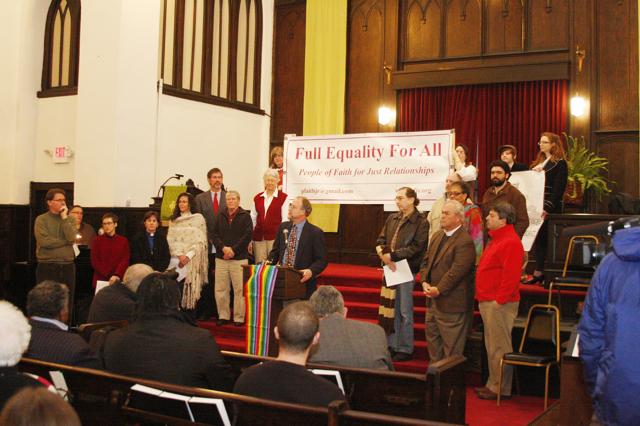A few hours before the Asheville City Council’s Jan. 25 meeting, about 25 local faith leaders and several Council members gathered at the First Congregational United Church of Christ on Oak Street to advocate for “full equality for all Asheville citizens.” The resolution pushed by People of Faith for Just Relationships calls on City Council to take four specific actions, including “extending the city’s employment nondiscrimination clause to include sexual orientation, gender, and gender identity or expression.”
“Today we are asking the city to act to the full extent of its powers to recognize same-sex relationships,” explained the Rev. Joe Hoffman, speaking on behalf of People of Faith. (The group’s members represent various traditions.) “As clergy and faith leaders, we experience firsthand the hardships and the struggles of people who are directly affected by these inequalities. And we say it is time to honor the full diversity of our city with full equality for all.”
The resolution also calls for enacting an anti-bullying ordinance covering all city institutions and grounds; creating a domestic-partner registry to recognize same-gender relationships in regard to assisted-living facilities, funeral rights, health care fights and other areas; and “endorsing and supporting the rights of same-gender couples to share fully and equally in the familial rights, responsibilities and commitments of civil marriage.”
The Rev. Shannon Spencer — like Hoffman a pastor at First Congregational United Church of Christ — blamed her own faith for some of the problems people of different genders and sexual orientations have faced. “Historically, it has been the Christian faith that has been used to marginalize and scandalize and oppress the LGBT community,” she declared. “In our attempt to bring about what we thought was righteousness, we failed to remember God’s love, forgiveness, justice and mercy.”
The Rev. Mark Ward of the Unitarian Universalist Church of Asheville noted that although things are getting better, society still has “a long way to go toward equality.
“We live in an amazing time, when most gay and lesbian and bisexual and transgender people are out and about in more ways than has ever been seen,” he observed. “We see this in business, in government, in politics and in entertainment. But the truth is, most of these people are still living as second-class citizens.”
Ward described the resolution as “a small step — just a little thing we can do … to make Asheville stand as an example of what it means to be a compassionate city.”
The roughly 50 supporters who turned out to endorse the measure included a voting majority of City Council members: Cecil Bothwell, Gordon Smith, Esther Manheimer and Brownie Newman. Bothwell said he expects Council to formally vote on the resolution in about a month, saying, “It’s pretty likely to be a done deal.”
Council voted to support domestic-partner benefits in principle last February, but the city is still working out how to implement the policy.
To view the full resolution, go to mountainx.com/xpressfiles/equality_resolution.
— Jake Frankel can be reached at 251-1333, ext. 115, or at jfrankel@mountainx.com.




why do we want to control everyone? Government free marriage is the only way to fix this issue. Time to change the argument. Why are we asking the government to control our lives? Why do we want the government to recognize anything? For or against should not be the argument, government free marriage NOW!
Thanks, Mtn. X, for covering this inspiring event.
For those of you who’d like to learn more about the Equality Resolution – visit http://nccommit.org – there you’ll find text of the Resolution, Domestic Partner Registry FAQs, and a form for you to add your name to the list of people who support this historic step forward.
Sarah, I think a better solution might be to separate spiritual marriage from marriage under law. The only reason governments ever got involved in marriage was to regulate property rights, not to approve or disapprove of loving relationships. Given that most people do not create contractual business relationships when they move in together and make babies, the simple marriage license confers a whole set of obligations and responsibilities. (The fact that there is no specific, clear-cut contract is what can make divorces so messy, and so prey to judicial meddling.)
Also, there are elements which have become attached to lawful marriage that cannot be conveyed by a two-party contract, such as survivorship benefits, social security disability benefits or parental rights.
A domestic partnership registry would help registrants assert a claim for rights such as visitation in the hospital, or participation in end of life decision making (though it wouldn’t have the legal weight of marriage), and might help as adoption law moves forward.
Note: I’m not a lawyer, this simply represents a fairly well-informed opinion.